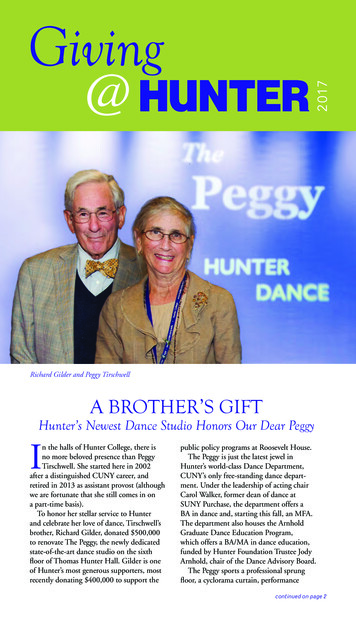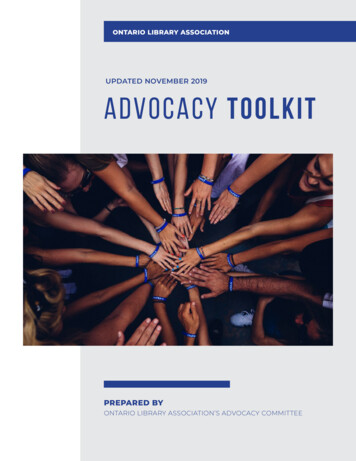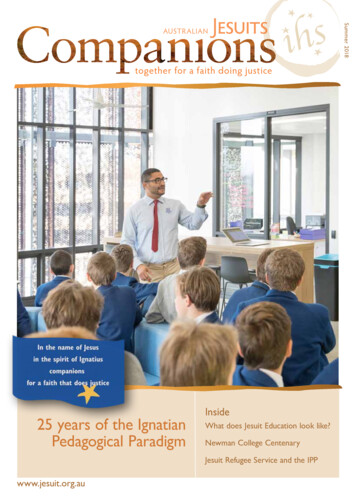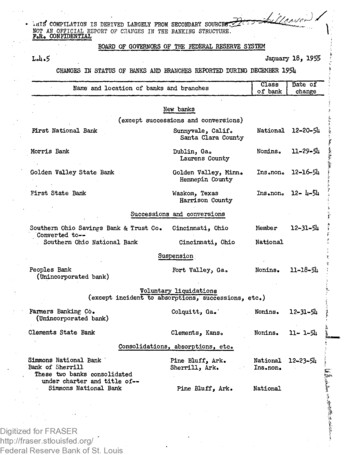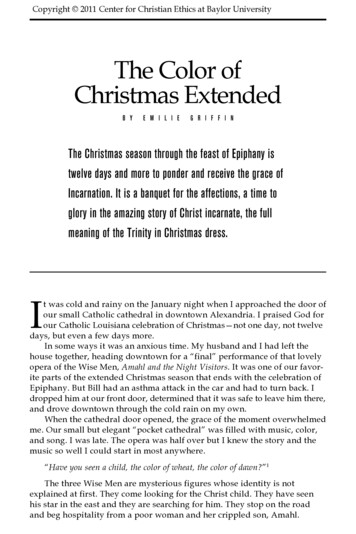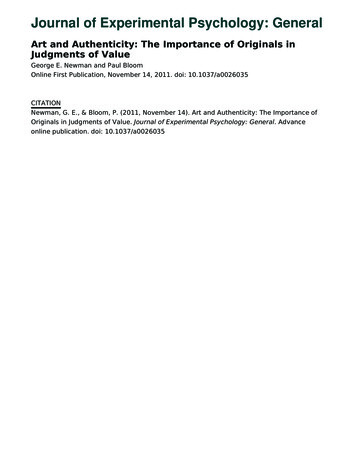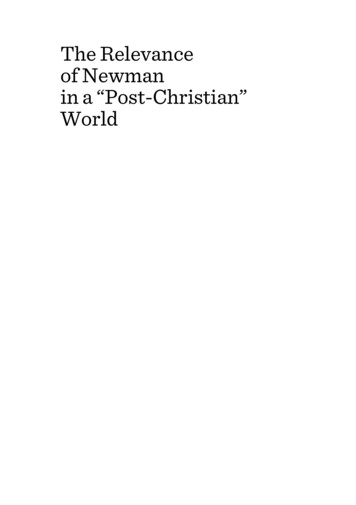
Transcription
The Relevanceof Newmanin a “Post-Christian”World
The Relevanceof Newmanin a “Post-Christian”WorldEdited byKeith Beaumont and Robert C. Christie
The Relevance of Newman in a “Post-Christian” WorldEdited by Keith Beaumont and Robert C. ChristieThis book first published 2021Cambridge Scholars PublishingLady Stephenson Library, Newcastle upon Tyne, NE6 2PA, UKBritish Library Cataloguing in Publication DataA catalogue record for this book is available from the British LibraryCopyright 2021 by Keith Beaumont, Robert C. Christieand contributorsAll rights for this book reserved. No part of this book may be reproduced,stored in a retrieval system, or transmitted, in any form or by any means,electronic, mechanical, photocopying, recording or otherwise, withoutthe prior permission of the copyright owner.ISBN (10): 1-5275-6304-9ISBN (13): 978-1-5275-6304-9
DEDICATIONThe editors wish to dedicate this book to our respectivefamilies:wife Karen, and children Ian, Erin, and late son, Eric,on the one hand,and Sr Barbara, O.P., on the other.
TABLE OF CONTENTSAcknowledgements . ixContributors . xiIntroduction . xviiPart I: A Broad Overview of the SubjectChapter One . 3The Relevance of Relevance: Newman, Schütz, SperberDidier RANCEChapter Two . 15The Understanding of “Selfhood” in Newman’s Thoughtand in Contemporary Western Philosophical CultureMichele MARCHETTOChapter Three . 27The Mind of Newman: The Theme of “Connectedness” as a Keyto His ThoughtKeith BEAUMONTChapter Four . 41Newman’s Principle of Development: The Gateway to ContemporaryInsightRobert CHRISTIEPart II: Newman on Education and FaithChapter Five . 59The Center of the Circle of Knowledge: Self-Knowledge in Newman’sThe Idea of a UniversityMichael OLSON
viiiTable of ContentsChapter Six . 71Newman and his Idea of a University as Viewed by a Scientist:An Encounter, a Translation and a Practice TodayPaul ROBINChapter Seven. 85“To Sweeten and to Sanctify”: Developing a 21st-century TeachingPhilosophy based on the Writings of John Henry NewmanChristine ANDERSONChapter Eight . 97From Benedict XVI to Newman: Faith, Reason and the UniversityPierre GAUTHIERChapter Nine. 111Incarnation: A Corporal Paradigm of Certitude in NewmanGrégory SOLARIChapter Ten . 125Conscience and the “Big Lie”: Newman’s Theological Epistemologyand the Solidarity MovementAlexander MILLERChapter Eleven . 141Evangelism and Living Assent in a Post-Christian SocietyBernadette WATERMAN WARDChapter Twelve . 153Newman’s Contribution to Inter-Religious DialogueRomuald EBOPart III: Newman’s Archive and First MiracleChapter Thirteen . 169Managing the Initial Digitization Plan of John Henry Newman’s ArchiveMary Jo DORSEYChapter Fourteen . 179“I Believe in the Communion of Saints”: The Story of a MiracleJack SULLIVAN
ACKNOWLEDGEMENTSWe wish to thank our respective organizations, the Association française(now francophone) des Amis de J. H. Newman, which was responsible forthe logistics and the organization of the 2014 Paris conference, and the SaintJohn Henry Newman Association, whose financial support for the Americanscholars made their participation at the conference possible.
CONTRIBUTORSIN ALPHABETICAL ORDERChristine ANDERSON is Chair of the Department of Voice and Opera andAssociate Professor of Vocal Studies at the Boyer College of Music andDance of Temple University in Philadelphia, PA. She holds a B.M. in Voicefrom Illinois Wesleyan University and earned both M.M. and D.M.A.degrees in Voice at the College-Conservatory of Music of the University ofCincinnati. She has sung numerous performances as soprano soloist withseveral prestigious contemporary music ensembles and has worked withsuch composers as Lukas Foss and Kristof Penderecki. Dr. Anderson alsotaught in the Musical Theater Department at the University of CincinnatiCollege-Conservatory of Music and has presented master-classes andpapers at national and international conferences such as the Australia VoiceSymposium, the Music Teachers National Association, and the HawaiiInternational Conference on Arts and Humanities.Keith BEAUMONT was born in Australia in 1944, obtained a Ph.D. fromWarwick University in the U.K., and taught French Literature at theUniversity of Leicester, U.K., from 1970 to 1991. Following a long path ofconversion, he was received into the Catholic Church in 1986 and decidedto radically re-orientate his life. He was ordained a priest of the FrenchOratory in 1996. He has taught courses on the history of spirituality and onJohn Henry Newman in several Catholic universities in France and preachednumerous retreats in monasteries and religious communities. He haspublished a dozen books on Newman, including anthologies and a majorstudy of Newman’s spiritual teaching (Dieu intérieur. La Théologiespirituelle de John Henry Newman, Paris: Éditions du Cerf, 2014). His mostrecent publications are an anthology of 25 sermons arranged thematically(Être chrétien, Éditions du Cerf, 2017) and an edition of the first Frenchtranslation of Newman’s two volumes of Catholic sermons. He is Hon.President of the Association francophone des Amis de Newman.Robert C. CHRISTIE is Emeritus Professor of Philosophy and Religion atDeVry University, North Brunswick, NJ. He is on the Board of Directorsand President of the Saint John Henry Newman Association, at Seton Hall
xiiContributorsUniversity, South Orange, NJ. He is editor of the Newman Association’snewsletter and is formerly Executive Director of the National Institute forNewman Studies, Pittsburgh, PA. He has both written and spoken aboutNewman at many conferences and in numerous books and periodicals. Mostrecently, he has edited, and contributed to, Saint John Henry Newman:Preserving and Promulgating His Legacy (Cambridge Scholars Publishing,2020). He is married with three children, Ian, Erin, and the late Eric.Mary Jo DORSEY is a native of Pittsburgh, Pennsylvania, who has livedand worked in Las Vegas, NV, and New York. She earned a B.S. in Biologyfrom Carlow University (1988), a Master's degree (1990) and a Ph.D. (2008)in Library and Information Sciences from the University of Pittsburgh.Currently at the University of Pittsburgh, she is a board member of the SaintJohn Henry Newman Association as well as its Communication Coordinator.She has studied the information-seeking behaviours of library and Internetusers, noting the many different paths users take toward information. Shehas lectured and presented papers on the inevitable shift from the physicallibrary to the digital library. She has taught graduate courses in library andinformation sciences at the University of Pittsburgh. She was the projectmanager for the digitization of the archives of John Henry Newman inBirmingham, England.Romuald EBO is a priest of the Diocese of Abomey in Benin, West Africa.Ordained in 2008, he was sent by his Bishop in 2009 to study spiritualtheology in Paris where he also exercised a ministry at the Cathedral ofNotre-Dame. In 2016 he was awarded a Doctorate by the Centre Sèvres(Jesuit Faculties of Philosophy and Theology) for a thesis on Newman’sconception of conscience and the place of the conscience within Christianspiritual experience as a whole, published as Expérience spirituelle etconscience chez John Henry Newman: éléments d’une théologie spirituellede la conscience (Saint-Léger Éditions, 2017).Pierre GAUTHIER is a priest of the Diocese of Rodez in south-westernFrance and Emeritus Professor of Philosophy in the Catholic TheologicalFaculty of the University of Strasburg (one of only two State universities inFrance permitted to have a theology faculty!). He is the author, amongstother works, of La Pensée religieuse de Richard Hurrell Froude, 1803-1836(Paris, 1977) and of a major work on the twin themes of tradition anddevelopment in Newman and the French philosopher, Maurice Blondel,Newman et Blondel. Tradition et développement du dogme, which waspublished by the Éditions du Cerf (Paris, 1988) in their prestigious
The Relevance of Newman in a “Post-Christian” Worldxiii“Cogitatio Fidei” collection. He also organized and coordinated thepublication in French of the eight volumes of Parochial and Plain Sermons.He has been a pillar of the French Association and a member of its Boardfor over 35 years. He lives now in semi-retirement in the Catholic parish ofMillau in the Diocese of Rodez.Michele MARCHETTO is Professor of Philosophy of Education andPhilosophical Anthropology at the IUSVE, Venice, which is linked to theUniversità Pontificia Salesiana in Rome. In 2005 he edited Newman’sScritti filosofici (which include the Oxford University Sermons, theGrammar of Assent, and the Philosophical Notebook), and in 2008 hisScritti sull’Università which include The Idea of a University, and Rise andProgress of Universities). Both volumes are introduced by long monographs.He contributed a study of La filosofia di John Henry Newman e le sfide delrelativismo to the volume Una ragionevole fede. Logos e dialogo in JohnHenry Newman (2009) and has also published Un presentimento dellaverità. Il relativismo e John Henry Newman (2010), as well as severalpapers on Newman’s idea of the person. He edited (with P. Manganaro) theproceedings of the international conference held in Venice, Maestri perchétestimoni. Pensare il futuro con John Henry Newman e Edith Stein (2017).His latest works are John Henry Newman. Identità, alterità, persona (2016),and Newman. Il primato di Dio e la formazione dell’uomo (2019).Alexander B. MILLER earned a doctorate in Historical Theology fromFordham University in the Bronx, New York. His primary field of researchis patristics, particularly the study of the Christian East and Near East, andhis doctoral research focused on the theological anthropology of Cyril ofAlexandria. However, since his undergraduate studies, Dr. Miller has beencaptivated by the interaction of conscience and epistemology in Newman’sthought, resulting in an article on “The Reasonableness of Faith and Assentin Newman’s Parochial and Plain Sermons and Grammar of Assent." Hisinterest in Jerzy Popiełuszko and the Solidarity movement is born of afelicitous discovery resulting from marriage.R. Michael OLSON is Associate Professor of Philosophy and Chair of thePhilosophy Department at Saint Michael’s College in Colchester, Vermont.He earned his doctoral degree in Philosophy from Emory University in 1998and works in the history of philosophy, with special interests in classicalpolitical philosophy, philosophical psychology, philosophy, and religion,focusing on such figures as Plato, Newman, and Kierkegaard. He has
xivContributorspublished and presented papers on St. John Henry Newman’s Grammar ofAssent and The Idea of a University.Didier RANCE is a Permanent Deacon (of both the Latin and Oriental rites)and former national Director of Aid to the Church in Need, France. Ahistorian by training, he is the author of some thirty books and of a vastnumber of lectures and articles on a wide range of subjects. Among his latestbooks are a biography of the English poet and mystic John Bradburne whowas killed in Zimbabwe in 1979, now available in English translation, TheVagabond of God, and Nietzsche et le Crucifié. He is currently working, atthe request of the Zimbabwean and Italian Bishops, on the Positio for thebeatification of John Bradburne and that of the Italian Franciscan Friar,Agostino Vicini. He is a Franciscan tertiary and Vice-President of theAssociation francophone des Amis de Newman.Paul ROBIN is an agronomist by training who worked at the prestigiousINRA (National Institute for Agronomic Research). He has also been forforty years at the service of the Church of the Diocese of Montpellier. Theconflict between faith and reason which he describes as potentially“schizophrenic” has its roots in his own experience. It took him thirty yearsto become reconciled to himself and to his Church, without however everleaving the latter. It is to John of the Cross and to Newman that he owes thisreconciliation. He is married with four children and seven grand-children(three of them English, one Canadian and one American).Grégory SOLARI is a philosopher (author of a thesis on “Newman’sCogito” in the Philosophical Notebook). He teaches at the Faculty ofTheology of the University of Geneva and is Director of the Éditions AdSolem, the principal publisher of Newman in France. He has published,amongst other books, in 2014 Le Temps découvert. Développement et duréechez Newman et Bergson, and in 2019 John Henry Newman. L’Argumentde la sainteté. He is married with three children. He is a member of theBoard of the French Association.Jack SULLIVAN is a Permanent Deacon of the Archdiocese of Boston,USA. After studying law at Suffolk University Law School in Boston heworked for 14 years as a lawyer and was then for 30 years a Chief Magistratein the Court system in Plymouth, Massachusetts. In 2000-2001, Jack wasinexplicably (in medical terms) cured of an excruciatingly painful backdisorder after appealing to John Henry Newman for his intercession, hiscure being subsequently recognized as the miracle which opened the way
The Relevance of Newman in a “Post-Christian” Worldxvfor Newman’s beatification. He was ordained a permanent deacon for theArchdiocese of Boston in September 2002 and serves as Catholic chaplainto a large prison in Plymouth, Massachusetts. He was asked by PopeBenedict XVI to serve as deacon at Newman’s beatification in September,2010, and his wife Carol, to whom he has been married for 45 years, wasasked to bring Newman’s relic to His Holiness as part of that same Mass.Since his miraculous cure, he has given talks all over the U.S. as well asconducting healing services with the only relic, so he believes, of St JohnHenry Newman outside of the Birmingham Oratory.Bernadette WATERMAN WARD, educated at Harvard and Stanford, isAssociate Professor of English and Director of Graduate Study at theUniversity of Dallas. She is the author of Eliot’s Angels: Mimetic Desire inGeorge Eliot’s Narratives (forthcoming, University of Notre Dame Press)and World as Word: Philosophical Theology in Gerard Manley Hopkins(CUA Press, 2002). Secretary of the St John Henry Newman Association,and a board member for more than two decades, she has written numerousarticles on Newman. She writes frequently on Hopkins and is on the boardof scholars for the Hopkins Quarterly. She is also on the board of UniversityFaculty for Life, and in that capacity publishes on more recent literature.She has published one drama and performs poetry as part of the BonehouseCollective. As a volunteer, she teaches English to immigrants.
INTRODUCTIONKEITH BEAUMONT AND ROBERT CHRISTIEOn 7-9 November 2014 a major international conference was held inParis, organized jointly by the Association française (now francophone) desAmis de Newman and the Newman Association of America, now The SaintJohn Henry Newman Association. The conference was attended by sometwenty Newman specialists from North America and a roughly equalnumber from France and other European countries. Its theme was “TheRelevance of Newman in a ‘Post-Christian World’” (“La Pertinence de lapensée de Newman dans un monde ‘postchrétien’”). Papers were given inEnglish or French, all having been translated in advance into the otherlanguage. The chapters of the present volume are all based on papers givenat that conference.What was meant by “post-Christian”? In choosing this theme, there wasno intention of suggesting that Christianity has completely disappearedfrom contemporary European or North-American society, nor indeed fromany other part of the world. There are moreover considerable differences inthis respect between different countries of Europe, and between Europe andNorth America. 1 The term was merely intended to signify that Christianitywas no longer a major reference for the great majority of those who, inWestern countries, shape public opinion in our modern world – in the media,in higher education, and in political life. All, or almost all, think and speakas if the question of God were no longer of any relevance to public life,“religion” being confined to the purely domestic sphere and being purely amatter of personal and private “opinion”. Christianity, it is widely believedamongst the opinion-makers, belongs to the past, its “dogmas” and itsIn France, for example, the principle of “laïcité” (which can be very roughlytranslated as “secularism” though there is no real equivalent in English) is all toooften understood not in the sense of neutrality but in that of exclusion. Since the Actof Separation of Church and State in 1905, for example, there is absolutely no placefor the teaching of religion in all State educational establishments, from primaryschools to universities (with the sole exception of the two Universities of Metz andStrasburg, which in 1905 were situated in Departments then under Germanadministration and where the Concordat of 1801 has never been abrogated).1
xviiiIntroductionvalues being simply outdated. The question therefore arises: what can athinker like Newman have to say to sophisticated and educated Westernmen and women who adopt, or are influenced by, such a view of things?It should be added, to avoid possible misunderstandings, that the choiceof the conference theme was in no way intended to suggest that Newmanhas nothing to say to Christians today! We are indeed convinced that he has.We simply wished to focus on the “post-Christian” aspect of the question,given the nature of contemporary culture and society.Within the broad theme of the conference, the choice of particularsubjects was left to the initiative of contributors (subject, obviously, to theagreement of the organizers). By remarkable good fortune – or, moreprobably, on account of the unity which characterizes Newman’s thought,despite the great variety of his writings – most of the papers can be groupedaround a number of thematic poles.The first four take a broad view of Newman and of the conference themeand constitute, in one way or another, an introduction to the conference.Thus Didier Rance poses with panache the question of the “relevance ofrelevance”. How are we to define such a term? He proposes a comparisonbetween Newman and three 20th century thinkers who have all dealt indifferent ways with the concept of relevance: the anthropologist DanSperber and the linguist Deidre Wilson, and above all Alfred Schütz, bankerby day and philosopher by night who had strong links with thephenomenological school of Edmund Husserl. Newman thus appears as aprecursor of 20th century phenomenology. The author stresses the parallelsin particular between Schütz’s conception of relevance and Newman’sconcept of “real assent”, touching along the way (but how could it beotherwise with Newman, given its centrality?) on the theme of faith. Finally,he suggests that, amongst other features of Newman’s thought, hisphenomenology of conscience and of the nature of assent, together with hisdistinction between the “notional” and the “real”, are as relevant today as inhis own time, and perhaps even more so.Next, Michele Marchetto, Professor of Philosophy of Education andPhilosophical Anthropology at two Italian universities, deals with thequestion of “The Understanding of ‘Selfhood’ in Newman’s Thought andin Contemporary Western Philosophical Culture”. He first analyses theimmense confusion which characterizes contemporary reflectionconcerning the concepts of the “person” and of the “self”, emphasizes theambivalence of contemporary anthropocentrism, and argues the need for a“return to the person”, seeing Newman as a precursor in this domain. Hejudiciously compares the latter’s thought with that of a number of 20thcentury phenomenologists and philosophers, notably Paul Ricœur. He
The Relevance of Newman in a “Post-Christian” Worldxixfocuses in particular on the “illative sense”, establishing a parallel betweenNewman’s analysis of this phenomenon in the Grammar of Assent and theconcrete example he provides of its functioning in the narrative of theApologia. Finally, he sees in Newman’s experience of conscience –expressed in his discovery of “myself and my Creator” – the expression ofa personalism which can provide a way out of the current confusion of ideas.Keith Beaumont, in “The Mind of Newman: the Theme of‘Connectedness’ as Key to his Thought”, then attempts to characterize thatmind. His starting point is a formula found in The Idea of a University whereNewman gives as the aim of university education the acquisition of “aconnected view or grasp” of things. Where many, in both past and present,have tended and tend to think in terms of oppositions or contradictionsbetween ideas, or phenomena, or areas of knowledge, Newman seeks on thecontrary to discover, and advocates the search for, the “connections” orlinks or relationships between these – for example, the “connectedness” orinterrelatedness of all academic disciplines, or the relationship between“dogma” and spirituality, or that between the “notional” and the “real”,between theology, ethics and spirituality, between the individual conscienceand the authority of the Pope, between change and continuity within theprocess of “development”. In place of the all too current reduction of ourconception of Christianity to just two “dimensions” – an intellectualdimension (“believing”) and an ethical one (the defence of certain “values”)– Newman proposes an “integrated” vision of the Christian life in whichthese two, admittedly necessary, dimensions are placed in the service of athird dimension, that of the interior or spiritual life. Newman thus offers theexample of a particular way of thinking or approach to reality which bothChristians and “post-Christians” have every interest today in developing inthemselves.Robert Christie’s chapter, on “Newman’s Principle of Development: theGateway to Contemporary Insight”, belongs to this first introductory groupthrough its detailed analysis of the characteristics of what constitutes a“post-Christian” and of the role of higher education in promoting this worldview. The author then examines what he calls the “aesthetic” vision ofNewman, that is to say his constant quest for a form of plenitude or totalityin place of the fragmented and narrow categories of thought whichcharacterize our current age, seeing in Newman’s vision a valuable antidoteto this limited range of thought. He shows how this vision is expressed inThe Idea of a University, in the last of the University Sermons, and in theEssay on Development. His analysis thus links up partly with that of thepreceding chapter whilst adopting a quite different approach, at the same
xxIntroductiontime looking forward to the chapters in the following group dealing with thetheme of education.This second group, then, focuses on Newman’s contribution to thinkingon education, with several authors touching also on the theme of the natureof faith.Michael Olson, in “The Center of the Circle of Knowledge: SelfKnowledge in Newman’s The Idea of a University”, starts from theobservation that our age suffers from an excess of “theories” and that thefascination exercised by these theoretical (or, in Newman’s terms,“notional”) constructions has led to a fragmentation of knowledge and to aloss of any sense of the individual as an integrated whole (his analysisjoining here that of Michele Marchetto). In Newman’s thought, whatconstitutes the center of the “circle of knowledge” is not any one disciplineor field of knowledge, not even what he calls “philosophy”, but theindividual self, that is to say the human person in its concrete reality, the“real” apprehension of which imposes an order on the diverse and separatedsciences. It is through the rediscovery of this self that the true “enlargementof the mind” of which Newman speaks in The Idea can actually occur.Paul Robin, in “Newman and his Idea of a University as Viewed by aScientist: a Practice, an Encounter, a Translation for today”, provides apersonal testimony to the important role played by his discovery of Newmanin “converting” him from scientific positivism to a more open andhumanistic world view, and in overcoming the threat of “schizophrenia”between his scientific mind-set and the requirements of religious faith.Newman’s Dublin lectures in particular led him to question and to rethinkcertain of his own mental categories, and indeed even the nature andfunctioning of the human mind. Newman also led him to understand in aquite different way the concepts of “truth”, “power” and “the Truth”, and tothe realization that there can not be two contradictory “truths” but onlypartial truths which must seek reconciliation in the mystery of the oneunique “Truth”. He concludes with a challenge addressed to all of us todayto seek and to integrate into our lives this reconciliation.Christine Anderson also provides an account of a personal journeyinspired by Newman in “‘To Sweeten and to Sanctify’: Developing a 21stcentury Teaching Philosophy based on the Writings of John HenryNewman”. As a professor of music and singing she has been confronted bythe challenges thrown up by the evolution of higher education with its hugeincrease in administrative and technical staff to the detriment of teachingstaff, and the reduction of the latter’s role to that of the purely impersonaltransmission of “knowledge”. She has thus been led to redefine her own“teaching philosophy” thanks to her progressive discovery of the ideas of
The Relevance of Newman in a “Post-Christian” WorldxxiNewman, not just in The Idea of a University but also in his sermons andother works, and above all of his conception in his Meditations andDevotions of a “mission” given to him – and to us – by God.In his paradoxically entitled chapter “Faith, Reason and the University:From Benedict XVI to Newman”, Pierre Gauthier occupies a position halfway between the theme of the university and that of faith. Rather thanattempting to show a spurious influence of one man on the other, heexamines the common ground shared by the two. Both draw upon theirexperience as university professors, both are steeped in a knowledge andlove of Classical Antiquity and of history. This common experience andshared knowledge led them both to emphasize the universality of knowledgeand its implications for the relationship between different universitydisciplines. Both also see an intimate link between faith and culture, asexemplified by the monastic tradition in which the quest for God lednaturally, through the study of the Scriptures and reflection on these, to thedevelopment of a whole literary and scientific culture. The common plea ofNewman and Pope Benedict for unity and integration may today seemutopian. But cannot a utopia serve as a warning, as well as a goal to be aimedat, even if that goal should seem forever merely a distant horizon?Grégory Solari, in a chapter entitled “Incarnation: a Corporal Paradigmof Certitude in Newman”, takes as his starting point a statement by Newmanin the Apologia that he was “more certain (of the reality of God as revealedby his conscience) than of having feet and hands”, a statement noticed bythe philosopher Wittgenstein (who found it “curious”). The author reflectson the nature of certitude, on the nature of the self and on its relationship tothe body, and proposes a comparison of the experience of Newman withthat suggested by the Cartesian cogito, arguing for a much broaderinterpretation of Descartes’ thought than the purely intellectualist oneusually given to it. He puts forward the hypothesis that Newman may haveintuitively grasped what phenomenology today calls the “living body”.In “Conscience and the Big Lie: Newman’s Theological Epistemologyand the Solidarity Movement”, Alexander Miller first examines Newman’sconception of conscience as a means of both self-knowledge and theknowledge of God, then studies in the light of these ideas the brief career ofthe Polish priest Jerzy Popieluzsko, chaplain to the Solidarity movement inthe 1980s, brutally murdered in 1984 by the State Security police andbeatified as a martyr in 2010 (his canonisation is under considerationfollowing a miraculous cure attributed to his intercession). In his sermons,preached during a monthly “mass for the fatherland” attended by thousandsof people, Popieluzsko denounced the “Big Lie” of Polish Communistpropaganda and the State’s manipulation of pe
DeVry University, North Brunswick, NJ. He is on the Board of Directors . (1988), a Master's degree (1990) and a Ph.D. (2008) in Library and Information Sciences from the University of Pittsburgh. . other works, of La Pensée religieuse de Richard Hurrell Froude, 1803-1836 (Paris, 1977) and of a major work on the twin themes of tradition and .





